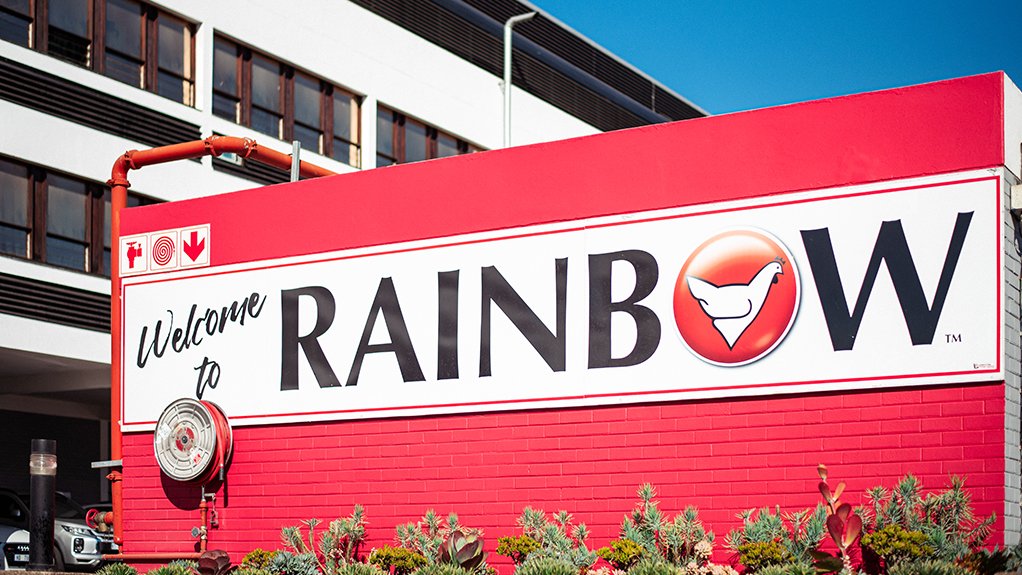Local poultry company Rainbow on August 28 “revived” a second operational shift at its Hammarsdale P2 processing plant in KwaZulu-Natal, while also commemorating the facility’s sixtieth anniversary.
Rainbow MD Marthinus Stander tells Engineering News this “revival” forms part of a signficant turnaround process for the company and is vital for bringing back jobs that were terminated in 2017 when Rainbow removed a shift as a result of the impact of import dumping in the domestic market.
This plant expansion marked an investment of R220-million from Rainbow and was bolstered by an additional R400-million investment by contract growers.
Key project components of the R220-million investment included the construction of 120 incremental new broiler houses, enhancements to the hatchery, the installation of air-cooling systems and equipment at the processing facility, and the construction of state-of-the-art gyro-type and box freezers.
The R400-million investment from contract growers, meanwhile, includes an overhaul of the supply and production chain within the KwaZulu-Natal region, spanning from farms and hatchery operations to processing facilities.
While 1 350 employees were retrenched in 2017, the Hammarsdale expansion has reinstated about 750 jobs, and Rainbow plans to reinstate an additional 100 jobs by June next year.
The plant expansion, as well as investment by contract growers, will play a signficant role in enabling growth in the poultry industry, as well as supporting rural development and communities.
“From an economies of scale point of view, it was important to restore volume back to Hammarsdale so that we can achieve overhead recovery as a result of economies of scale,” says Stander.
This investment into the plant also allowed Rainbow to implement new technology at Hammarsdale, which will help the company retain its position as a pioneering poultry farming company since Hammarsdale was opened in 1963.
“The Poultry Industry Master Plan is central to this equation. One of the pillars of the master plan is growth, through growing demand through initiatives, but also by exports.
“To grow, however, you need investment, so we’ve been investing in significant key industry growth. We’re playing our part as Rainbow and as part of the industry. The industry cannot be successful without government creating an enabling environment,” he adds.
The R220-million investment was used to increase capacity at Hammarsdale, Stander notes.
In 2016, Rainbow was processing about 1.2-million chickens a week at Hammarsdale. After a shift was removed, this was reduced to about 600 000 a week.
Owing to this reduction, many farms that supplied to Rainbow had to be sold.
“We needed to find new farms and farmers, and for that purpose we used a contract growing model. We integrated every other aspect of the whole value chain, including feed, breeding, agroprocessing, distribution and sales. But you can outsource the farming part of the broilers. One can make agreements with the contract growers, and they can use that to get finance from the banks.”
Rainbow is supplied with chickens and feed from contract growers.
Stander points out that using this method is a well-known and sustainable method of farming.
He also emphasises the importance of the improvements to the facility’s cooling and refrigeration capacity, particularly in terms of preventing bacterial contamination and increasing shelf life.
He also stressed the benefits this can provide, noting that, while some local retailers prefer frozen supply, others prefer fresh supply.
“Between 2018 and 2021, we got back to producing 900 000 chickens a week, with more or less one shift and a bit extra. Since April this year, we’re back to 1.1-million a week, almost where we were in 2016.
“Between now and the end of March next year, we’re bringing on more contract growers, and then we’ll get to 1.5-million chickens a week. For Rainbow, it means we’re back and here to stay, we’re growing and we can service a wider product mix to a wider customer mix,” Stander enthuses.
MASTER PLAN ALIGNMENT
He also stresses the importance of Rainbow and other industry players aligning with government’s implementation of the Poultry Industry Master Plan, and that initiatives of the plan, such as reducing import dumping, will be beneficial for the industry.
“We’ve seen more anti-dumping tariffs, as one of the pillars is to reduce imports. In South Africa, we prefer chicken on the bone predominantly, and we used all parts of the chicken. In the developed world in places like Europe and the US, however, the preference is for breast meat.
“They recover the costs by selling breast meat, and then have breast meat and dark meat left over. We’re an ideal dumping ground because of our preference for meat on the bone, and that we use the whole chicken,” Stander explains.
Further, he also states that the South African poultry industry is internationally competitive and that the industry can grow substantially if it continues receiving anti-dumping support from South Africa’s government.
“It's fantastic that we contribute to food security and rural development. Chicken is the most versatile protein and it’s why South Africans love it. It's an industry we want to protect. The master plan says let's grow this industry, let's see if we can grow exports with this industry because we are competitive.
“The master plan addresses dumping, and it also addresses issues such as transformation.
“Where we do feel there’s still a lot to do for government, however, is in enabling exports. This requires government intervention in opening markets, answering health questionnaires, setting up independent test facilities such as laboratories and other helpful measures,” Stander says.
Edited by: Chanel de Bruyn
Creamer Media Senior Deputy Editor Online
EMAIL THIS ARTICLE SAVE THIS ARTICLE
ARTICLE ENQUIRY
To subscribe email subscriptions@creamermedia.co.za or click here
To advertise email advertising@creamermedia.co.za or click here













